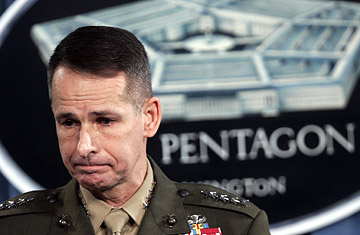
Chairman of the Joint Chiefs of Staff Gen. Peter Pace pauses as he speaks during a news conference November 29, 2006 at the Pentagon in Arlington, Virginia.
The problem, say the uniformed and retired critics, is that outgoing Secretary of Defense Donald Rumsfeld hand-picked every four-star commander, personally interviewed every significant three-star appointment, and, in a break with his predecessors, even selected some two-stars for a grilling. The result, many critics argue, is a group of generals who were too reluctant to stand up to Rumsfeld and possibly face getting tossed aside like Army Chief of Staff Eric Shinseki, who was sidelined after saying that the Iraq war would require "hundreds of thousands" of troops.
A prime example of the "Rumsfeld man," in the opinion of citics, is Chairman of the Joint Chiefs of Staff, Gen. Peter Pace. The first Marine to hold the chairmanship and a decorated Vietnam veteran, Pace has the background of a courageous warrior. But active duty and retired officers contend that Pace, who was vice chairman before Rumsfeld backed him to take over the top post last year, has been blindly supportive of Rumsfeld, going out of his way to praise him.
Pace, like all chairmen, serves a two-year term, which expires next summer. Virtually all the chairmen have been reappointed for a second two-year term, but if Gates wants to send a sharp message to the brass that he wants generals who more willing to challenge him in private, he could replace Pace. A confidant of Gates told TIME two weeks ago that such a move was unlikely. "Replacing Pace is a very big move before next summer and I am not sure he wants to be that disruptive," said the friend of Gates. But rumors that Pace will be ousted are growing. One of the possible replacements: Marine General Jim Jones, a former Commandant of the Marine Corps and head of European Command. Jones is a savvy Washington political player who was quoted in Bob Woodward's book State of Denial warning his friend Pace not to be a "parrot" for the Bush Administration.
If Gates were to remove Pace, however, he would almost certainly have to also replace Adm. Ed Giambasitiani, the current vice chairman, who was Rumsfeld's military aide and is seen as even closer to the outgoing Secretary. Replacing both top military advisers so quickly might be too drastic a shakeup, since it would require two new top appointees to get up to speed quickly.
The Pentagon rumor mill is also abuzz with the question of whom Gates will choose to replace Army Gen. John Abizaid as chief of Central Command, the region that includes both Iraq and Afghanistan. Abizaid and Army Gen. George Casey, the ground commander in Iraq, have overseen the war for years and are drawing at least some of the blame for allowing Iraq to disinintegrate on their watch. As Douglas MacGregor, a retired Army Col. and military writer, observed recently: "Tactical blunders have strategic consequences and the generals have blundered badly in Iraq. In war, military strategy is supposed to reduce the probability of armed conflict, to persuade those who might fight not to fight, and when necessary, to win at the least cost in lives and treasure. In Iraq, the top generals achieved the opposite outcome." Said one retired senior officer: "I'd like to see a war commander be more of an asshole. They are fighting the war — they should be demanding every single thing they want, from troops to equipment, and getting it when they want it. The rest of the military should be bitching and moaning about them. But there is no sense of urgency."
Abizaid is expected to retire. Casey was long though to be in line for the job of Army Chief of Staff, but a former Administration official says that plan may now be dead. "It looked too much like Casey would be rewarded for the job he has done in Iraq, and that's not what Gates wants," says the source. The front-runners for Abizaid and Casey's jobs include Army Lt. Gen. David Petreaus and Army Lt. Gen. Peter Chiarelli. Both have served in Iraq and both are seen as having focused on the "hearts and minds" aspect of the war in Iraq.
But some retired Marine officers argue that at least one of the two Army generals running CENTCOM should be replaced by a Marine, since traditionally the two services have switched off in the past. The three senior Marine generals with Iraq experience who are not seen as "Rumsfeld men" are Lt. Gen. John Sattler, who is currently the military's top policy maker in the Pentagon; Lt. Gen. James Mattis, who led the successful initial invasion of Iraq for the Marines; and Lt. Gen. Robert Blackman, who worked on the planning for the invasion, but now heads Marine Forces Command.
During his testimony in front of the Senate Armed Services Committee, Gates said he would listen to the advice and counsel of the military leadership. Now it's time to see which of those generals he will change.
